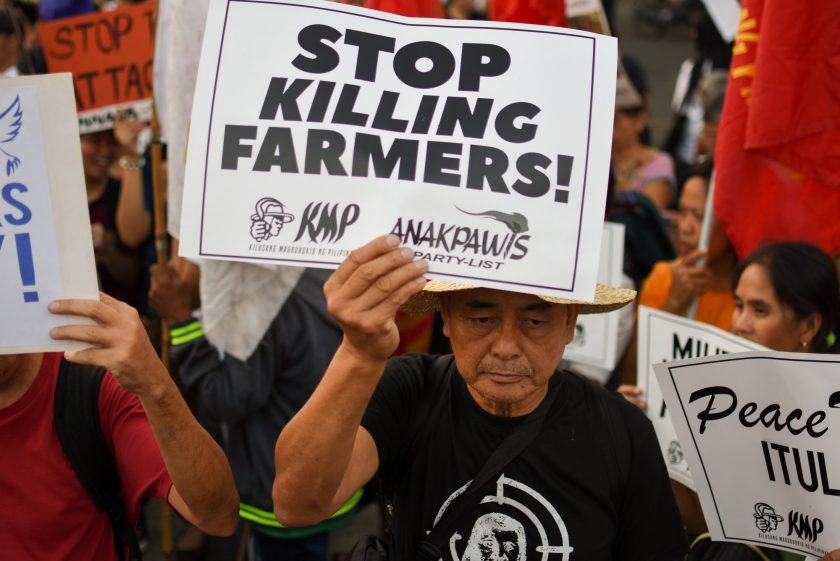By ANNE MARXZE D. UMIL
Bulatlat.com
MANILA – For the past 33 years, Teresita Arjona, 61, have been travelling to Manila to commemorate the death of her husband, Danilo, and 12 more farmers who were victims of Mendiola massacre on Jan. 22, 1987.
Justice remains the call of Arjona and the rest of the families who lost their loved ones when state forces opened fire upon protesting farmers during the administration of the late President Corazon Aquino.
Kilusang Magbubukid ng Pilipinas (KMP) said that administrations may have changed but not the conditions of majority of the Filipino. They belied claims of the so-called “Duterte legacy,” saying that farmers are being killed and many Filipinos are still in dire poverty.
“Thirty three years have passed but farmers are still landless, there’s still no justice and peace,” said KMP Chairman Emeritus and Anakpawis President Rafael Mariano in a forum held on Wednesday, Jan. 22. After the forum, they marched to Chino Roces bridge (former Mendiola) to call for justice for the slain farmers.
“Mendiola Massacre will forever remain as a bloody emblem of the Philippine government’s failure to implement genuine agrarian reform, the perpetuation of the political killing of farmers and land reform advocates, and the persistence of the decades-old problem of feudal exploitation and poverty of Filipinos,” Mariano said.
Killing of farmers worse under Duterte
Data from Unyon ng Manggagawa sa Agrikultura (UMA) shows that under Duterte, 244 farmers were killed.
The latest victim, Pelagio Compoc, a farmer and barangay tanod was shot by suspected state agents while tending to his carabao in the morning of Jan. 22 in barangay Dagoho, Bilar, Bohol.
Under Duterte, several massacres were also recorded specifically in areas of Negros where Memorandum Order No. 32 is implemented.
De facto martial law terrorizes civilians in Negros, Bicol, Eastern Visayas
40 days after Sagay massacre, groups condemn ‘heightening state terror’
If not being killed, farmers suffer from hunger as policies such as the Rice Liberalization Law.
World biggest rice importer? Peasant group renews call to junk liberalization law
Arnie Gallardo, human rights officer of Alyansa ng mga Magbubukid sa Gitnang Luzon – Nueva Ecija (AMGL-NE) said that farmers are suffering due to the low cost of palay, pegged at only P16 per kilo. He said farmers have gone bankrupt due to the implementation of the rice liberalization.
Farmers who have chosen to cultivate idle lands were harassed by the military, Gallardo said. There are three battalions deployed in Nueva Ecija. The AMGL-NE Chairman Ignacio Ortiz is also under heavy surveillance by intelligence agents.
Nueva Ecija bungkalan | ‘Our struggle put food on our table’
Addressing the root cause of landlessness
Mariano said agrarian reform program of the past administrations failed to address the landlessness of farmers in the country.
Mariano said this could have been addressed if only the peace negotiations between the National Democratic Front of the Philippines (NDFP) and the Philippine government were not halted by what he called as “peace spoilers” in the military/
Both panels have reached the essential part of the peace negotiations, the Comprehensive Agreement on Social and Economic Reforms (Caser), before Duterte terminated the peace talks.
#CASERGoals | ‘Peace talks can change lives of poor Filipinos’
Caser is the second of the four substantive agenda set in peace negotiations by both parties. The first agenda, the Comprehensive Agreement on the Respect for Human Rights and International Humanitarian Law (CARHRIHL), was signed in 1998 during the term of then President Joseph Estrada.
In his message during the forum, NDFP Consultant Randall Echanis said there was a significant success in the four negotiations held during the early years of the Duterte government. The reciprocal working committees on social and economic reforms (RWC-SER) of both panels have formed common drafts of Caser and agreed on the parts of agrarian reform and rural development as well as national industrialization and economic development.
On the fourth round of peace negotiations in April 2017, RWCs-SER have also agreed on free land distribution as basic principle of genuine agrarian reform.
“This is the important gain on the fourth round of peace talks. Free land distribution to the farmers and farm workers is the important part of agrarian reform and rural development and national industrialization and economic development,” Echanis said.
This is why Arnajo and peasant groups urged the public to continue their support and push the government to resume peace talks with the NDFP.
“An approved CASER, with the provision of free distribution of land to poor farmers, benefitting tens of millions of families in the countryside, is the real legacy, not the garbage his fanatics are attempting to craft,” said former Anakpawis representative Ariel Casilao.
The post Death, hunger are Duterte’s legacy — farmers appeared first on Bulatlat.



